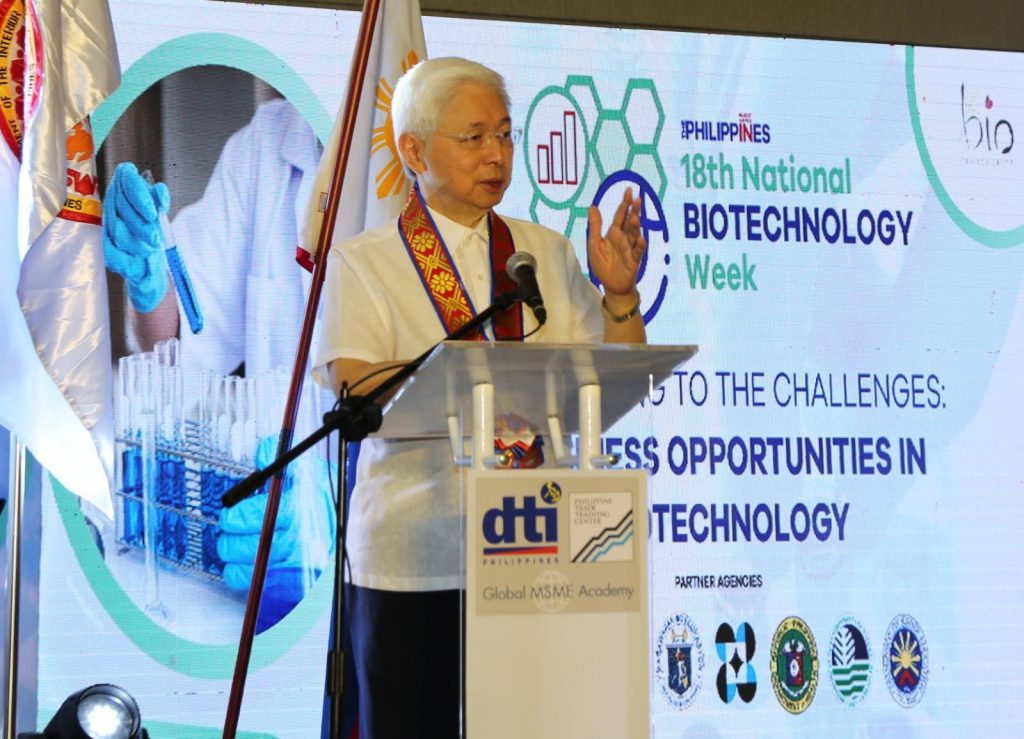
Thank you to everyone in the National Biotechnology Week Inter-Agency Committee for working alongside us at the Department of Trade and Industry (DTI) in organizing this event. My fellow workers in government—CHED, DA, DENR, DILG, DOST, DepEd, DOH, our collaborators from IRRI, PhilRice, SEARCA, ISAAA Inc., Biotech Coalition of the Philippines, CropLife and UP BIOTECH. Distinguished guests, exhibitors, ladies and gentlemen, a pleasant morning to you all.
Science, technology, and innovation, these are keys to moving our country toward an advanced, inclusive, and resilient future. On this 18th National Biotechnology Week, our theme is “Responding to the Challenges, Business Opportunities in Biotechnology.” In the exhibit and activities lined up for this celebration, we connect biotechnology, business, academe, and government to present potential areas of growth.
This week-long celebration of biotechnology takes on a special meaning as the pandemic brought into sharp focus the promising role that this branch of science can play.
Biotechnology’s breakthrough products and technologies feature multi-faceted benefits. Aside from creating novel diagnostics, vaccines, and combatting debilitating and rare diseases, they can reuse clean energy; make efficient energy usage; our environmental footprint: feed the hungry and make industrial manufacturing processes safer, cleaner, and more efficient.
That’s why we at DTI regard modern biotechnology as a vital tool to achieve the primary agenda of this government—economic recovery and transformation. Effectively harnessing biotech will increase our agricultural productivity, allow us to achieve food security, and modernize our industry and services sectors. Biotech cuts across the priority industry clusters we have previously identified—from Industrial, Manufacturing and Transport (IMT), to Technology, Media, and Telecommunications (TMT) Health and Life Sciences (HLS), to Modern Basic Needs and Resilient Economy. It will allow the our country to create, if not strengthen, our links in global value chains.
In achieving our shared goal to build and grow globally competitive and innovative Philippine industries, biotech applications are an important boost. With biotech, we can realize cross-cutting industry transformation and modernization in, among others, the fields of agriculture, food manufacturing, energy, medicine, pharmaceutical, biomaterials, and bioengineering.
Biotech can help solve the country’s food security issues affected by increased population and climate crisis-affected agriculture. The ongoing research between the International Rice Research Institute (IRRI) and Bioseed Research Philippines Inc. seeks to bolster yields for our favorite staple food. This research project aims to develop rice varieties that can better cope with floods, droughts, and extreme climate phenomena.
The Philippines has already successfully adopted biotech in 2003 when we became the first Asian country to plant a biotech crop, the Bt corn. Recently, the Philippines earned the badge of regional biotechnology leader for our passage in 2021 of Golden Rice for commercial propagation and Bt eggplant for direct use. The United States Department of Agriculture (USDA) and Global Agriculture Information Network (GAIN) released October last year the Agricultural Biotechnology Annual Report. In it, they also commended our country for moving forward on a regulatory framework for genetically enhanced animals and products of innovative biotechnologies.
Aside from enhancing crop production and performance, shortening crop varietal development, and improving livestock production, biotech also produces bio-fertilizers and biofuels from agricultural waste—a climate-change adaptation measure.
Another modern biotech breakthrough is the establishment last July of InterVenn, a Filipino-founded, San Francisco-based biotech firm. The company has made significant strides in early cancer detection through the help of brilliant and dedicated Filipino engineers who have helped build and maintain the front end, back end, and cloud infrastructure of the next-generation liquid biopsy. The company’s advanced AI platform was able to help its global groups of researches and scientists significantly reduce the time it takes to analyze samples from months to mere seconds. Aside from its impact on health, the biotech company also affects jobs as it employs 150 Filipinos, half of whom are software developers.
DOST’s Philippine Council for Industry, Energy, and Emerging Technology Research and Development (PCIEERD) has several projects in the pipeline for modern biotechnology application in the Philippines, particularly for the agriculture sector. There is the Varietal Development of Saba/Cardaba banana, which among others delays banana ripening for longer shelf life. The Sago Bio-Tech Program, the Fuel Ligno Project, the Physico-chemical and Microbiological Study of Virgin Coconut Oil, and other projects will hopefully translate to establishment of local biotech firms. Down the line, it will create more jobs, increase local production and consumption, as well as yields for the export market.
Biotech companies can expect ease of doing business in the Philippines. The Board of Investments (BOI) has listed biotech-enabled production, manufacturing, and service-type activities in the 2022 Strategic Investment Priority Plan (SIPP). These firms may avail of tax incentives and perks under Republic Act 11534 or the Corporate Recovery and Tax Incentives for Enterprises (CREATE) Act. Biotech-enabled activities related to food security and R&D activities on modern biotech or its commercialization are considered Tier II and Tier III activities. Meaning, these projects can enjoy a better set of incentives such as an income tax holiday of at least 5 years.
Mga kababayan, the DTI continues to provide unwavering support to the country’s biotechnology and biotech-enabled industries. You can rely on us in creating an enabling environment for these innovation-driven activities to thrive and become globally competitive.
As I end, let me say that we, Filipinos, have a great capacity for ingenuity, creativity, and imagination. Our national hero Dr. Jose Rizal not only sparked the nation to fight for its freedom but also served the community of Dapitan, Zamboanga with his skills and innovation in building irrigation and water systems, brick production, street lighting, and so much more.
May the exhibit and activities this week serve as the seed for growth of biotechnology in our country. Let us make more biotech happen in the Philippines. Thank you. ♦
Date of Release: 28 November 2022


